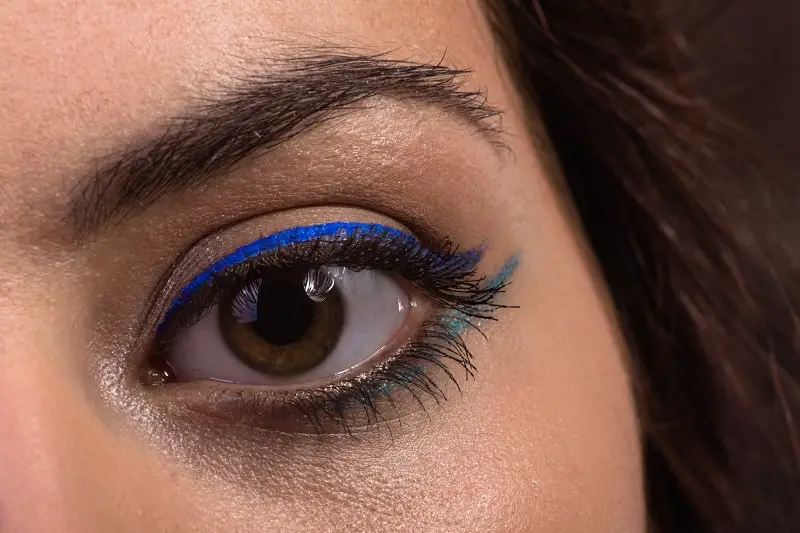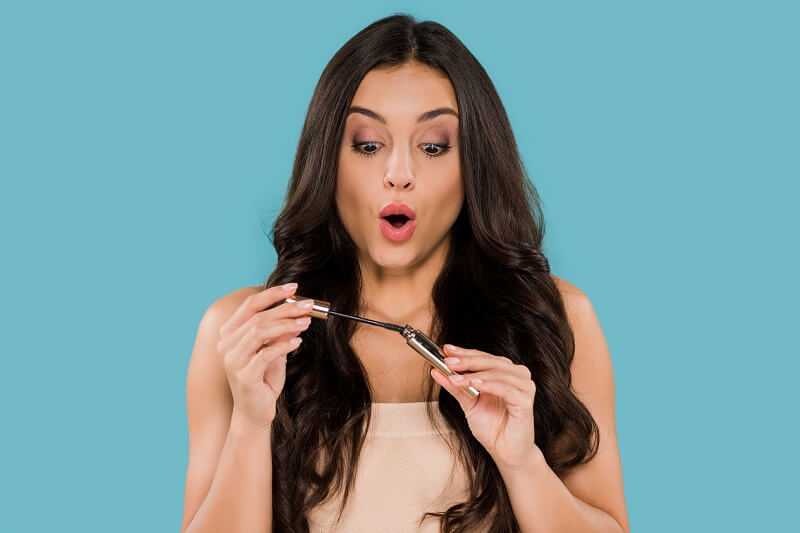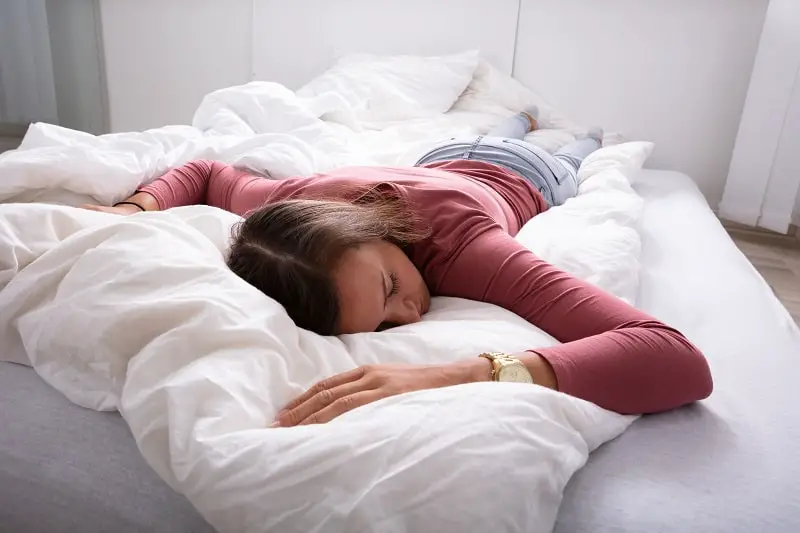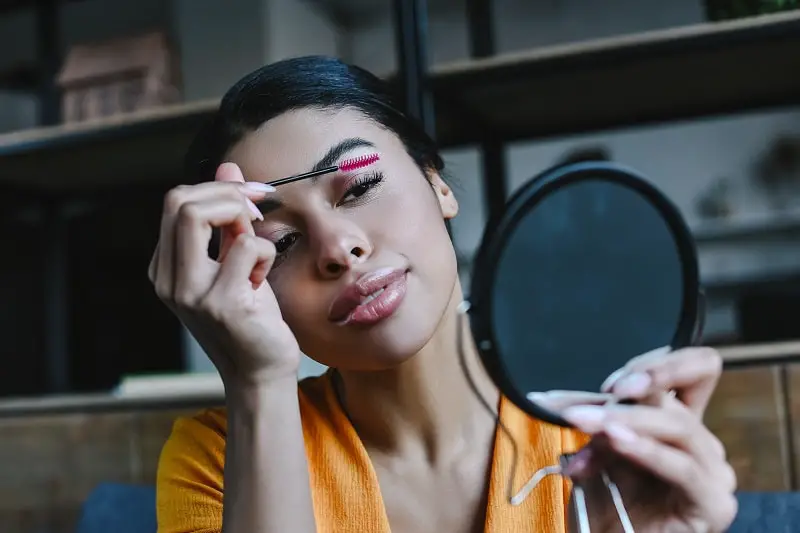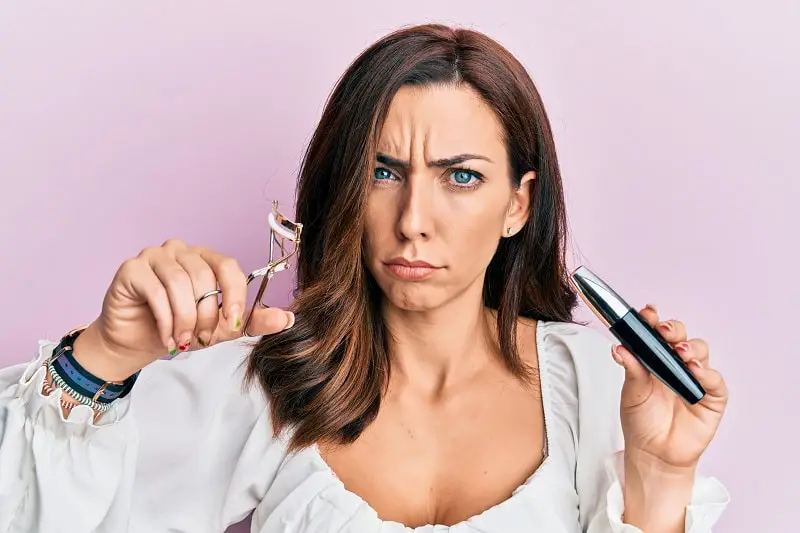Brown vs black mascara: which one is right for you? You may be wondering this very thing if you’ve noticed that your go-to mascara isn’t doing you justice.
Or, if you just want to know whether you’re getting the most ‘bang’ for your buck. Luckily, we’ve got you covered. Below you’ll find all the information we’ve gathered about the topic to aid you in reaching a verdict.
Do note that the answer has a lot to do with color theory in makeup. For more information on the theory, check out this in-depth makeup fundamentals blog post by Manicare. Without further ado, let’s get down to business.
Which Is Better Black Or Brown Mascara?
It all comes down to how you look so there is no easy answer here. Formula-wise, neither black nor brown mascara is better than the other. It is the same thing in a different shade.
What it does come down to is which product will be able to add more emphasis to your eyes. Whether or not black mascara suits you better than brown—or vice versa—relies entirely on the individual. This is literal, along with mere personal preference.
Now, to find this out will require an open mind and a willingness to deviate from your comfort zone. Believe us, we know it can be difficult to try out new makeup once we’ve got our favorites. To find out what is “better” for you, look no further than your eye and hair color, and skin tone.
Black is oftentimes quoted to be a universal shade that can enhance any eyes. While true, those of you who have a darker complexion, hair, and eyes may benefit more from it. As it is, black is an attention-grabber: black clothes stand out in a crowd and black hair can be wonderous at framing the right face.
This is not without mentioning the color’s longtime association with elegance and power. Considering this, black mascara is amazing at making a statement. Vanessa Hudgens, Gabrielle Union, and Lady Gaga are just a couple of household names that never fail to disappoint with their fierce black mascaras.
On that note, despite working wonders for dark-haired folk, we did mention black mascara being universal. Again, looking at celebrities we can see Taylor Swift, Emma Stone, and Britney Spears all donning black mascara at big events. At this point, black mascara becomes a preference. After all, it is a classic!
Meanwhile, brown mascaras tend to better complement blondes and redheads who have lighter eyes. Brown mascara is great at making light lashes look darker without making them look too unnatural. Furthermore, being opposite blue and green on the color wheel is a bonus: the emphasis is guaranteed.
When comparing the two, black mascara can overwhelm blue or green eyes. It tends to distract from the iris rather than enhance it. As we know, this can ruin an entire look. An even more undesired effect can make the wearer appear tired, causing their light eyes to appear dull.
On another hand, brown mascara may not do enough justice for individuals with dark hair. Those who have dark hair may notice that their lashes appear pale when they wear brown mascara. For this reason, black mascara is more favorable if you have darker hair—regardless of eye color.
Brown vs Black Mascara: What Color Mascara Suits My Skin Tone?
The color of mascara that suits your skin tone best relies largely on … not really your skin tone. Your complexion doesn’t necessarily have a major hand in what mascara you should use.
Undertones can certainly help sway you towards warmer or cooler shades, though this is a small detail in a much bigger picture. Instead, we first advise that you look at your present hair color.
In all, the lighter your hair then the “softer” shades you would want to wear. This means that if you have very light blonde hair or are a natural redhead, then you would want to go with a light brown mascara. Basically, the darker the hair then the darker we would like our mascara to be.
Now that we established that, we can take a look at the role undertones play in choosing a mascara. Hint: it is minor, but can subtly impact the rest of the makeup.
According to celebrity makeup artist Robert Sesnek, folks with deeper skin tones and deeper eye color usually tend to have warmer undertones, whereas those with very fair skin and lighter eyes tend to have cool or neutral undertones.
Is your complexion warmer? Are you on the cooler side of things? Maybe you’re a true neutral. Although the answer won’t likely impact your primary color choice, it can help determine which mascara undertones to lean into.
For example, if you have cool undertones and want to wear brown mascara, find one that is more cool than warm. Formulas that lean into one or the other could either enhance or diminish your eyes.
As a general rule, black mascara looks good on anyone, regardless of skin tone. If you’re fair-skinned wear brown mascara. A deeper, blackened brown mascara is a good choice for olive and medium skinned women.
What Color Eyes Should Wear Brown Mascara?
To enhance your natural eye color, we recommend those with blue, green, and hazel eyes wear brown mascara. More than anything, this has to do with the colors being across from each other on the color wheel.
According to color theory, cooler colors act as an emphasis on warmer ones and vice versa. Brown mascara can benefit those with blue, green, or hazel eyes by creating a subtle contrast. This contrast draws attention to their eyes without overwhelming them, which can be the case with black mascara.
By the same token, brown eyes can benefit far more from black mascara than brown. It is here that we should mention that too much of something isn’t always a good thing. Ergo, brown mascara should be avoided by those with similarly brown eyes.
But wait just a minute! You’ve probably heard that those with brown eyes can totally wear brown mascara. And, that’s right. We’re not trying to mislead you. Truthfully, individuals with brown eyes can wear brown mascara, if it is a darker shade than their eyes.
What Color Eyes Is Black Mascara Good For?
Black mascara works best for brown eyes. With incomparable richness and depth, brown eyes need a darker shade to properly contrast them. This is where black mascara comes to save the day. When looking to enhance one’s natural eye color, we want to create a contrast.
Much as the case with those with blue, green, or hazel eyes, whatever color complements your eyes best works. Note that we want to enhance our eye color, not overpower it.
Or worse: distract from it. Whereas lighter eye colors can appear dull with an overabundance of black mascara, brown mascara can completely nullify brown eyes.
Now, we’re not saying that those with lighter eyes can’t wear black mascara, nor are we arguing that brown-eyed beauties can’t wear brown mascara. Once more, your mascara is up to you and your unique tastes and preferences.
Should Blondes Wear Black Mascara?
Blondes should avoid black mascara if they have particularly light hair. As we stated previously, we suggest blondes use brown mascara instead for several reasons. First and foremost, black mascara can appear harsh when compared to light hair.
Black mascara runs the risk of making blondes look washed-out. This especially rings true for those beauties with light eyebrows. Now, if your hair is a darker blonde and this is reflected in your eyebrows, then by all means wear black mascara.
The best example of this is the legendary blondie, Britney Spears. She has darling doe-eyes and doesn’t shy away from black mascara. Next, a large concern for blondes and black mascara is the risk of robbing the face of the eyebrow’s framing qualities.
Indeed, what could happen is that the black mascara could distract from your eyebrows, and even risk making them “disappear.” Of course, this has become a trend in recent times: Met Gala 2021 and 2022 saw the rise of bleached eyebrows.
Also, how can we forget the buzz in the beauty community when Lizzo donned bleached eyebrows in June of ‘21? For those of you more interested in this groundbreaking trend, Kristen Bateman for W Magazine thoroughly explores the history behind bleached eyebrows.
Unfortunately, the bold, light eyebrow look isn’t for everyone. What if, instead of looking to draw attention to your fair brows, you’re looking for something to accommodate them?
At the end of the day, eyebrows can make or break a face. If your mascara isn’t up-to-snuff then your full-face of makeup can end up being entirely too underwhelming.
Should Redheads Wear Black Or Brown Mascara?
Redheads will benefit more from a light brown mascara. Similar to the issues blondes face, many redheads have light eyebrows and light eyelashes to boot. A worthwhile brown mascara can add length and volume all while keeping the lashes looking natural.
Speaking of natural, there is a mascara out there that has been formulated for red hair. Gingerlash Mascara is by Redhead Revolution and currently comes in two shades: Honest Auburn and Genuine Ginger. If you have struggled with finding the right shade of brown to keep your fair lashes looking legit, try Gingerlash.
Getting back on topic to further discuss the impact black and brown mascaras have on redheads, there are exceptions to the brown mascara rule. If your eyebrows are considerably dark, bordering on brown, it may be best to wear black mascara.
A light coat of black mascara wouldn’t hurt. Alternatively, if you are looking to draw tons of attention to your eyes, black mascara will make them stand out.
In general, those with dark brown eyes and very dark hair want to avoid light brown mascara. Both redheads and blondes tend to be excluded from this because, more often than not, their hair is just the right shade to appear natural in brown mascara.
Final Thoughts: Is It Better To Wear Black Or Brown Mascara?
To tie everything together, let’s just say finding the right mascara isn’t easy. In fact, it is way too difficult. There are many factors to consider, especially if you prioritize some aspects over others. The right mascara also depends on what look you want to accomplish.
An example would be something for day-to-day wear or something to tie together a full face of glam. Staples of a good mascara—notwithstanding color, shade, and undertones—include an easy, smooth application and a long-lasting formula.
You don’t want something that will clump up, nor do you want a product that will dry out within a week of opening. Furthermore, select a shade based on your hair and eye color. Settle on lighter shades for fair hair and eyes, and darker shades for anything more than a honey brown.
A good rule of thumb is to choose the general color based on your intentions and your other makeup. The aforementioned casual day wear will be quite different from the lashes demanded of someone attending a rave. Lastly, your undertones can help determine what mascara tone to lean into.
Once more, it is worth mentioning that these are guidelines based on our research. In no way do you have to follow these recommendations to a ‘T.’ Additionally, if you have a favorite mascara that falls outside of the realms we addressed, keep it.
If it is of good quality and works for you, that’s the end of the discussion. We simply ask that, if you are willing to, experiment. Try new things because otherwise, you will never know if a product is better than another.
Who knows, maybe your next go-to mascara will be one you wouldn’t have dreamed of giving a chance. Well, dear reader, you have reached the end of the article. Hopefully, we were successful in clearing the air on this topic.
Recommended
If you enjoyed reading this article, check out some of our other amazing blog posts:

